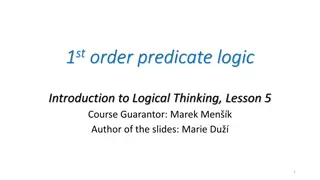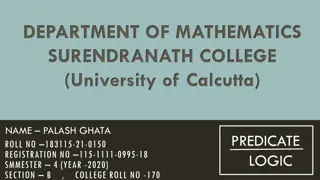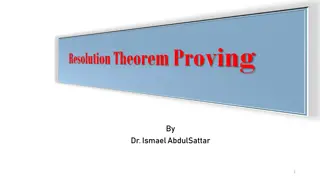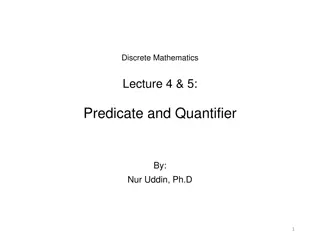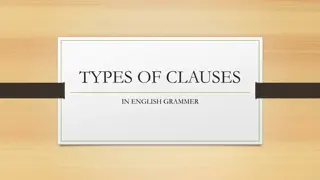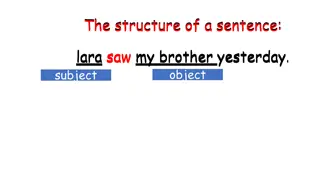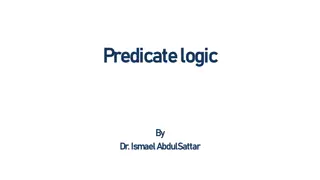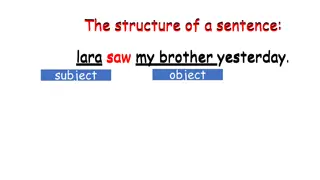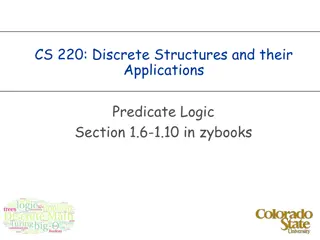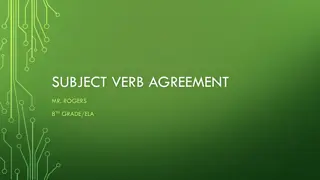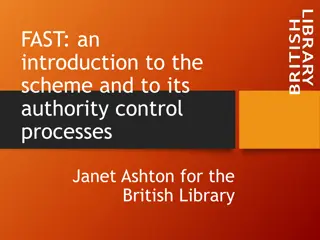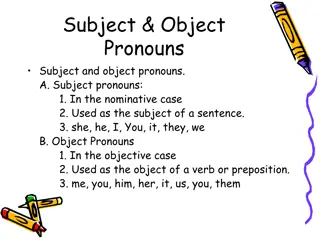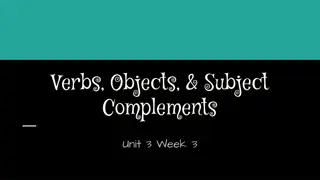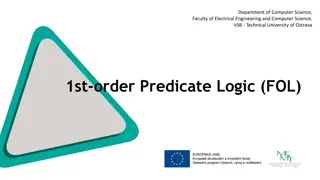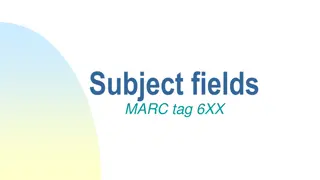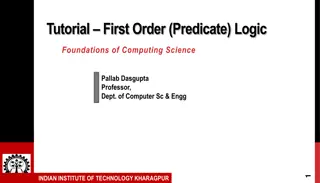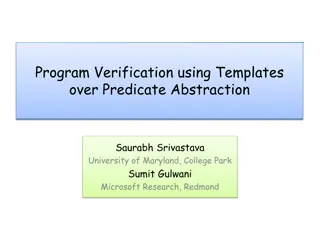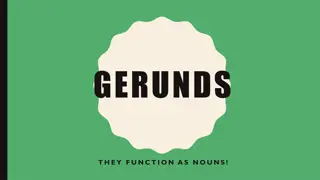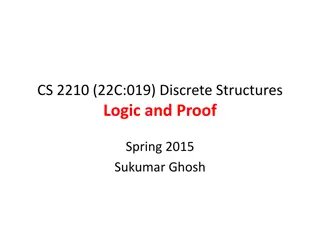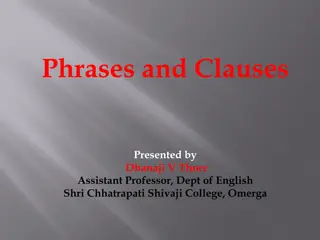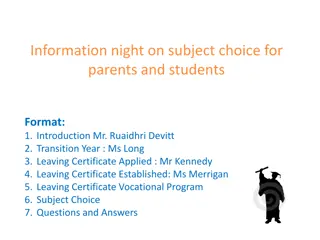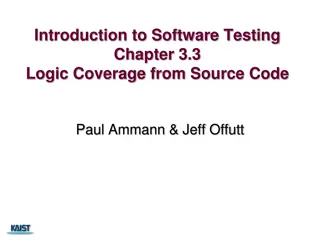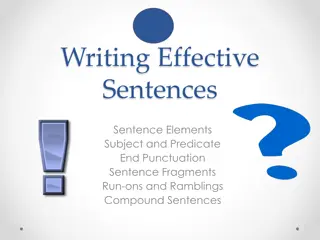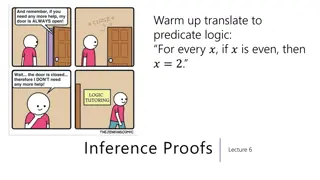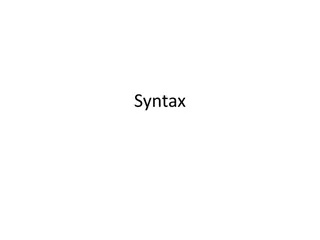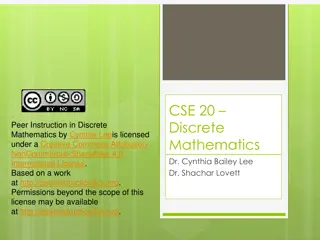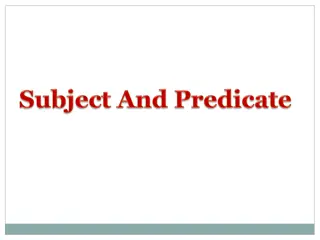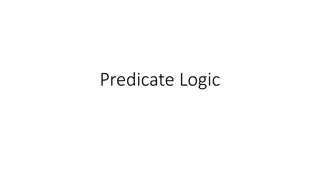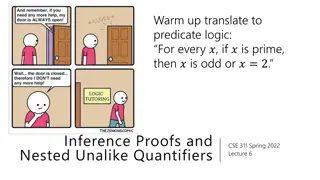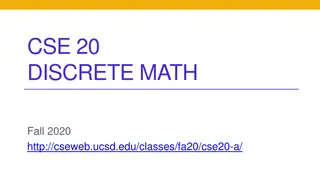Explore Economics as a Leaving Certificate Subject
Economics as a Leaving Certificate subject prepares students for diverse career paths in business, finance, and management. The course includes a research project and a structured exam format. With a focus on theory, practical application, and real-world economic concepts, Economics equips students
5 views • 11 slides
Introduction to 1st Order Predicate Logic in Logical Thinking
Explore the limitations of propositional logic and the enhanced expressive power of 1st order predicate logic (PL1). Understand how PL1 allows for analyzing the structure of atomic propositions and proving arguments that depend on these structures. Through examples and valid argument schemata, delve
1 views • 26 slides
Understanding Predicate Logic in Artificial Intelligence
In the world of artificial intelligence, predicate logic plays a crucial role in representing simple facts. It involves syntax, semantics, and inference procedures to determine the truth value of statements. Real-world facts are represented using propositions in logic, allowing for structured knowle
1 views • 19 slides
Understanding Linking Verbs and Predicate Words in English Grammar
Linking verbs connect the subject of a sentence with a predicate word, while predicate words follow a linking verb to identify, rename, or describe the subject. Learn about sentence patterns, forms of linking verbs, and how to differentiate between linking and action verbs. Understand the role of pr
2 views • 31 slides
Understanding Word Order in Different Languages
Explore the fascinating world of word order in languages. Discover how different languages arrange words in various ways, such as Subject-Verb-Object (SVO), Subject-Object-Verb (SOV), and more. Delve into the diversity of word orders for subjects, objects, and verbs, and uncover how language structu
3 views • 31 slides
Introduction to Predicate Logic in Mathematics
Predicate logic is a powerful tool used in mathematics to express complex relationships and assertions that cannot be adequately represented by propositional logic. It allows for the quantification of statements over a range of elements using predicates and quantifiers like universal and existential
2 views • 13 slides
Understanding Resolution Theorem Proving in Predicate Logic
Resolution theorem proving is a method used in predicate logic to find contradictions within a database of clauses. By negating statements and applying resolution rule of inference, it aims to show inconsistency to prove the original theorem. The process involves putting premises into clause form, a
0 views • 24 slides
Introduction to Predicate Logic and Quantifiers in Discrete Mathematics
In this lecture series by Dr. Nur Uddin, we delve into the limitations of propositional logic and the introduction of predicate logic as a more powerful tool for expressing statements in mathematics and computer science. Learn about predicates, quantifiers, and how to reason and explore relationship
3 views • 13 slides
Understanding Noun Clauses and Their Functions
A clause is a group of words containing a subject and predicate forming part of a sentence. Noun clauses act as nouns in a sentence and can function in various ways, such as being the subject or object of a verb, participle, or preposition. They are identified by asking "who" or "what" questions and
0 views • 23 slides
Understanding Types of Clauses in English Grammar
A clause is a fundamental unit of a sentence, comprising a subject and predicate. Learning about the different types of clauses - Independent, Dependent, Relative, and Noun clauses - helps in enhancing grammar skills and sentence structure understanding. Independent clauses stand alone as complete s
2 views • 11 slides
Understanding Subject Injury Policy and Reporting at OHSU
Explore the subject injury policy, identification process, and reporting guidelines at Oregon Health & Science University (OHSU). Learn how subject injuries are defined, identified, and distinguished from other reactions in research studies. Get insights into determining if an adverse experience qua
0 views • 17 slides
Understanding Subject Pronouns and Sentence Structure
Learn about the structure of a sentence, the use of subject pronouns to replace subject nouns, and how subject pronouns come before verbs with examples. Subject pronouns like "she," "he," "they," and "we" are essential in forming clear and concise sentences.
0 views • 5 slides
Understanding Subject-Verb Agreement in English Grammar
In this multimedia class session, Assistant Head-teacher Uttam Adhikary introduces the concept of subject-verb agreement, emphasizing the importance of matching singular subjects with singular verbs and plural subjects with plural verbs. Through engaging examples and presentations, students will lea
1 views • 41 slides
Understanding Predicate Calculus: Symbols, Terms, and Variables
Predicate calculus extends propositional calculus by introducing symbols like truth values, constants, variables, and functions. It allows for precise manipulation of components within assertions, enabling the creation of general statements about classes of entities. Learn how predicates define rela
1 views • 14 slides
Understanding Subject Pronouns in English Sentences
Learn about the structure of a sentence and the role of subject pronouns in replacing subject nouns. Subject pronouns come before verbs and help to make sentences clear and concise. Examples provided demonstrate how subject pronouns are used effectively in various sentences.
0 views • 5 slides
Understanding Predicate Logic: From Propositional to Predicate Logic
Transitioning from propositional to predicate logic allows reasoning about statements with variables without assigning specific values to them. Predicates are logical statements dependent on variables, with truth values based on those variables. Explore domains, truth values, and practical applicati
0 views • 34 slides
A Guide to Subject-Verb Agreement Basics
Understand the essentials of subject-verb agreement in sentences. Learn how singular subjects match singular verbs and plural subjects pair with plural verbs. Discover key rules, including handling words between the subject and verb, dealing with prepositional phrases, and recognizing subject placem
1 views • 7 slides
Understanding FAST: A Brief Overview of the Faceted Application of Subject Terminology
FAST (Faceted Application of Subject Terminology) is a subject standard with a controlled vocabulary derived from LCSH and NACO. It provides a faceted vocabulary that is easy to assign and interrogate, making it well-suited for libraries. British Library has adopted FAST as its preferred subject sch
0 views • 19 slides
Understanding Subject and Object Pronouns
Learn about subject and object pronouns, their usage in sentences, and examples to differentiate between them. Subject pronouns are used as the subject of a sentence, while object pronouns function as the object of a verb or preposition. Understand when to use pronouns like "I" or "me," "they" or "t
0 views • 13 slides
Understanding Verbs, Objects, and Subject Complements in Grammar
Learn about direct objects, indirect objects, and subject complements in grammar. Direct objects receive the action of the verb, while indirect objects indicate to whom or what the action is done. Subject complements follow linking verbs and describe or identify the subject. Examples and images are
0 views • 5 slides
Understanding Compound Sentences: Examples and Usage
A compound sentence is a group of words containing a subject and a predicate, expressing a complete idea. It can be brief or extended with qualifiers. Independent clauses are combined with coordinating conjunctions like "and," "but," or "or" to form compound sentences. Semicolons and transitional ex
0 views • 8 slides
Understanding First-Order Predicate Logic in Computer Science Education
Exploring the concepts of first-order predicate logic in computer science, this content delves into the formal language, grammar, and logical form of arguments. It covers the importance of moving beyond propositional logic, introduces valid schemata, and illustrates the structure of atomic and compo
0 views • 23 slides
Understanding MARC Subject Headings
Access points in MARC records provide information about what a resource is or what it is about. Commonly used subject headings include personal or family names, corporate body names, conference names, uniform titles, topical subject headings, geographic subject headings, genre or form subject headin
0 views • 21 slides
Predicate Logic Problems and Solutions
Explore various scenarios and challenges in predicate logic, from converting statements to normal form to reasoning using predicate logic. Dive into encoding sentences in first-order logic, understanding FOL formulas, and formalizing sentences with FOL formulas.
0 views • 7 slides
Developing PE Subject Leadership Course Overview
This course aims to enhance subject leadership skills in Physical Education, focusing on leadership development, exploring the role of subject leaders, and improving outcomes for pupils. Participants will reflect on their leadership stage, revisit the core purpose of subject leadership, and develop
0 views • 49 slides
Program Verification Using Templates Over Predicate Abstraction
This research explores a technique that allows for inferring invariants with arbitrary quantification and boolean structure, improving the state-of-the-art in program verification. It can infer weakest preconditions, helping with debugging and analysis by discovering worst-case inputs and missing pr
0 views • 32 slides
Understanding Nouns and Their Functions in Sentences
Gerunds function as nouns in sentences and can serve various roles such as subjects, direct objects, and predicate nouns. Nouns act as the subject of a sentence, telling who or what the sentence is about. By identifying the subject in sentences, you can understand its role and importance in conveyin
0 views • 22 slides
Understanding Predicate Logic in Discrete Structures
Explore the nuances of predicate logic in discrete structures, which go beyond the limitations of propositional logic. Learn about predicates, quantifiers, and how to negate quantifications. Dive into examples and understand how to translate logical statements into English effectively.
1 views • 45 slides
Understanding Resource Description Framework (RDF) for Semantic Web
Resource Description Framework (RDF) is a key data model for the Semantic Web, providing a standard way to represent knowledge through subject-predicate-object triples. RDF serves as the foundation for various knowledge representation languages and ontology tools on the web. Through RDF, relationshi
0 views • 36 slides
Understanding Phrases and Clauses in English Grammar
This content dives into the concepts of phrases and clauses in English grammar, presented by Assistant Professor Dhanaji V. Thore. It explains how a phrase is a group of related words lacking a subject and predicate, while a clause contains both a subject and a predicate to form a complete sentence.
1 views • 23 slides
Guidance for Subject Choices: Parents and Students Information Night
Providing essential insights on subject choices for parents and students, this information night covers key areas such as Transition Year, Leaving Certificate options (Applied, Established, and Vocational), subject selection process, potential future implications of subject choices, complementary su
0 views • 25 slides
Logic Coverage in Software Testing
Logic coverage from source code involves deriving predicates from decision statements in programs, where most predicates have less than four clauses. Wise programmers aim to keep predicates simple, as they affect coverage criteria such as COC, ACC, ICC, and CC, which collapse to predicate coverage (
0 views • 11 slides
Mastering Sentence Structure for Effective Communication
Understanding sentence elements such as subject, predicate, end punctuation, fragments, and compound sentences is crucial for crafting clear and concise writing. A sentence must express a complete thought, start with a capital letter, and end with appropriate punctuation. Recognizing and avoiding fr
0 views • 14 slides
Understanding Predicate Logic and Quantifiers for Symbolic Proofs
Dive into the realm of predicate logic and quantifiers, exploring the nuances of symbolic proofs and evaluating logical statements. Learn about bound variables, domain considerations, and strategies for constructing iron-clad proofs using quantifiers.
0 views • 36 slides
Understanding Syntax in Linguistics
Words in a language are organized into phrases and clauses with specific syntactic categories like Noun Phrase, Verb Phrase, and Adjective Phrase. Each phrase has a head such as a noun, verb, or adjective, and phrase structure rules help diagram the syntactic structure. Clauses are the largest units
0 views • 20 slides
Peer Instruction in Discrete Mathematics Overview
Explore the fundamentals of discrete mathematics through Predicate Quantifiers, Paradoxes, and Proof Strategies in Peer Instruction. Gain insights on Predicate Love examples and strategies for proving or disproving quantified statements. Enhance your understanding of nested quantifiers and predicate
0 views • 10 slides
Understanding Subjects and Predicates in Sentences
Every complete sentence consists of a subject and a predicate. The subject is who or what the sentence is about, while the predicate tells something about the subject. By identifying subjects in sentences, you can gain a better understanding of sentence structure. Practice finding subjects in senten
0 views • 10 slides
Understanding Predicate Logic and Quantifiers
Predicate logic extends propositional logic by allowing statements to be assigned specific values. The limitations of propositional logic are overcome through predicate logic, where statements like "?. is greater than 3" have subject and predicate parts denoted as ?(?). Furthermore, predicates can b
1 views • 20 slides
Predicate Logic and Proofs in CSE 311
Explore the translation of statements into predicate logic, learn about inference proofs and nested quantifiers, and delve into the application of logical thinking in real-world scenarios. Discover a new way of constructing proofs and understand notation laws of inference. Engage in interactive proo
0 views • 37 slides
Understanding Predicate Logic in Discrete Mathematics
Explore the concepts of predicates, truth values, quantified statements, and DeMorgan's law in discrete mathematics. Learn how to define, evaluate, and apply predicates using tables, functions, and truth sets. Dive into universal and existential statements, counterexamples, and witness-based argumen
2 views • 14 slides

